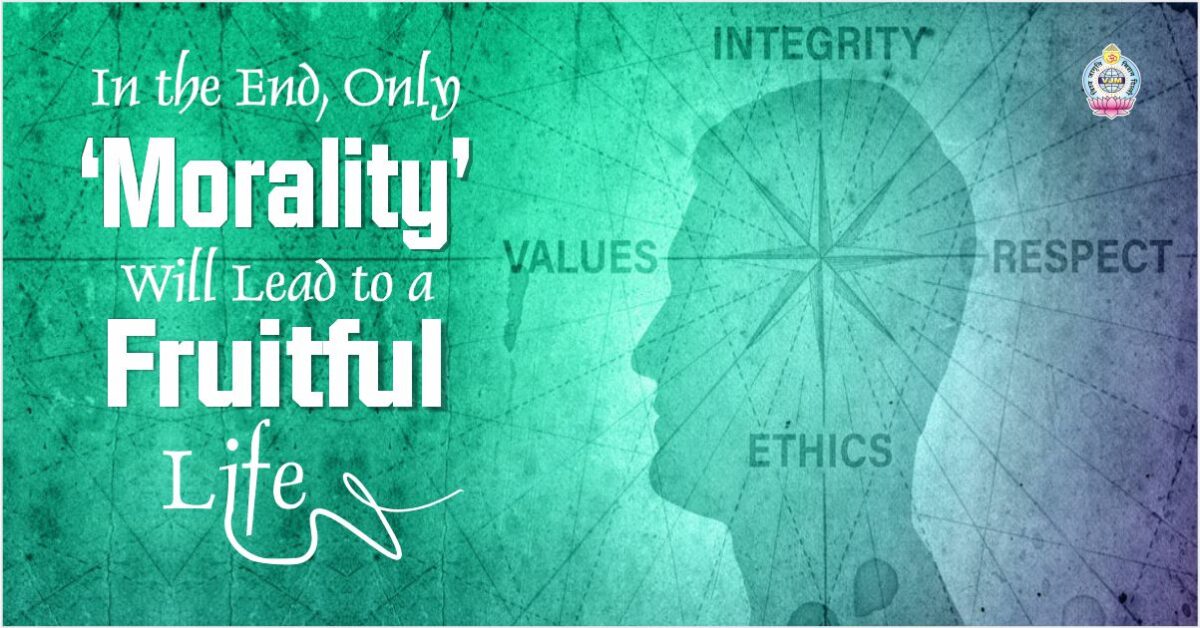In the End, Only ‘Morality’ Will Lead to a Fruitful Life
Our great country India is the divine custodian of hundreds and thousands of religious scriptures.
We have, at the top, four Vedas, then four Up-Vedas, then Six Vedanga (limbs of the Veda), then four Brahman Granth, then we have about 200 Upanishads, six Darshan Shastra, and after that, we have Maanav Dharm Shastra, then Vangmay, Eighteen Puraan, Eighteen Up-Puraan, about 84 Smriti Granths, and after that we have Sant Vanees, Ramayan, and Gita (about 32 forms of it like Hans Gita, Ram Gita, Sita Gita), which is actually a part of the Mahābhārata, which has about 100,000 verses and is the longest poem in the world.
And all these scriptures mainly teach, among other things, morality and social ethics. They teach how to live a pure life, how to maintain righteousness and how to live a virtuous life so that we can achieve the grace of Paramātmā.
Let’s say this, Morality and Social Ethics are the foundation of all these teachings. But what is morality?
What are Ethics and Morality?
Ethics can be described as the science of morality, and morality as the way of living a virtuous life. Real men place great emphasis on the attitude of the mind rather than on the postulation of the elaborate theories of what is right and what is wrong.
Accordingly, a wide vision of morality and ethics is characterized by the following consideration-
Morality comes from the inner spirit of man. It can be said that one’s motive is as important in the performance of action as the action itself.
When one performs his duties with a pure heart, free from desire and greed, he is of high moral value.
Harmlessness to all creatures is the highest morality as well.
Sources of Moral Conduct
There are four sources of moral conduct; Vedas, the Smriti (Secondary Scriptures), the conduct of wise persons, and the individual’s own judgment.
In times of confusion and crisis, one’s own conscience is the sole guide that shows the right path.
An individual is ultimately accountable for his own actions, i.e., the Law of Karma, he is also responsible for the actions of others if he influences them to perform similar actions.
Loyalty to one’s moral values is the highest morality, and of all the losses, loss of one’s character and loss of judgment is the worse. Never fall prey to that and stay cautious as immoral activities are highly alluring and rewarding initially, but ultimately, they lead to eternal suffering.
You should learn the right lessons from those who are living a righteous life and follow a great code of conduct by heart.
Components of A Good Code of Conduct
- Don’t harm others by word, deed or thought
- Refrain from lying and betraying promises
- Refrain from intolerance and ill will
- Overcome fear, indecision and fickleness
- Conquer callous and insensitive feelings
- Renounce fraud, cheating and stealing
- Observe purity of the body, mind and intellect
- Have resolute faith in God’s grace
- Faithfully follow Guru’s advice
- Sharpen the intellect with Guru’s guidance
- Perform meditation and Sadhana as outlined by the Guru
Refrain from Immoral Activities, Always
Understand that, any immoral activity has unfavorable consequences. It affects countries, homes, and individuals. Immoral activity is not only about bribes but also about corruption at every level in society. Corruption is a profound act of immoral mindset and it eats away the foundation of the strongest nations rendering them vulnerable to external enemies. Only people of morality can pluck the weeds of corruption and help create fertile land for the welfare and progress of all.
People, especially the poor, face hardship due to a lack of resources. Similarly, the weak and silent person in the family suffers the most if there is exploitation within the family. It may also be worthwhile to share some advantages of being moral.
Morality helps shape a better Society: Help make society better by being moral and get rewarded with making a better life for yourself. Without good moral conduct, our society would be a wretched and unhappy place.
Morality helps in making Equality a Possibility: Equality is a cornerstone of any country where all share the same rights. This is impossible if the majority of the citizens behave immorally.
Morality helps to reduce Stress in Relationships: Immoral decisions lead to tension and stress in family and relationships. Due to one or two family members, some may feel uncomfortable in the house and that may lead to unnecessary stress. For staying happy in the family, try to refrain from immoral behavior always.
Humanity must understand that, ultimately, morality and social ethics are important not so that ‘we can live a religious life’, but rather so we can ‘improve how we live with others peacefully’.
So, be moral, enrich your life and the lives of your loved ones. Because in the end, only ‘morality’ will lead to a fruitful life.
Blessings!

